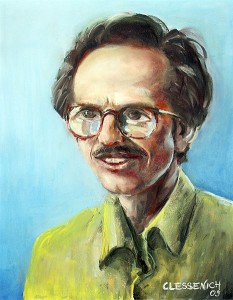R. Crumb, who likes cans (and LSD), and Al Goldstein, the late admirer of beaver (and electronics), compare hairy palms in the latter half of the ’80s in Northern California. Prior to the interview, Goldstein kindly offers Sean Penn an ass-whooping.
Ideas and technology and politics and journalism and history and humor and some other stuff.
You are currently browsing articles tagged R. Crumb.
R. Crumb, who likes cans (and LSD), and Al Goldstein, the late admirer of beaver (and electronics), compare hairy palms in the latter half of the ’80s in Northern California. Prior to the interview, Goldstein kindly offers Sean Penn an ass-whooping.
Tags: Al Goldstein, R. Crumb
The earlier post about Ken Kesey mentioned Stewart Brand’s 1974-84 periodical, The CoEvolution Quarterly. The Spring 1976 issue, which focused, much to Lewis Mumford’s consternation, on space colonies, was written up in the Harvard Crimson. An excerpt:
“THE MAIN ARTICLE in the Spring issue deals with space colonies. It runs 48 pages, featuring 76 famous people or friends of Stewart Brand (guiding light of The Catalog and editor of The Quarterly) writing on what they think about the possibilities of building cities in space. The article includes not only such popular scientists as Carl Sagan, Lewis Mumford, and Buckminister Fuller, but also Richard Brautigan and poet Gary Snyder.
It seems rather pointless and maybe just a little silly to discuss cities in space when New York is in such a predicament, and to Brand’s credit, he publishes viewpoints radically dissimilar from his own, which is that these cities can’t come soon enough. Mumford states that, ‘I regard space colonies as another pathological manifestation of the culture that has spent all its resources expanding the nuclear means of exterminating the human race. Such proposals are only technological disguises for infantile fantasies.'”
Tags: Lewis Mumford, R. Crumb, Stewart Brand

"Ewww. My dad is not like that to me at all, ever. We didn’t have orgies." (Image by Christian Lessenich.)
In this Sunday’s Times Magazine, Deborah Solomon takes a break from disemboweling the Lorraine Braccos of the world to interview artist Sophie Crumb, who discusses a new book of her work and her famous (and infamous) father, R. Crumb. An excerpt from the Q&A:
“Deborah Solomon: You make him sound nurturing, but his most famous character and alter ego, Fritz the Cat, is a selfish, pot-smoking tomcat who is fond of orgies.
Sophie Crumb: Ewww. My dad is not like that to me at all, ever. We didn’t have orgies. He’s different toward me than he is with other people. Gentler. He’s the one who played Barbies with me. We had a name and a personality for each Barbie, and he gave each one a tone of voice.
Deborah Solomon: Is he attentive in other ways? Does he cook?
Sophie Crumb: He can’t do anything, except draw and play. He can’t drive. He can’t swim. He’s totally dyslexic. He’s left-handed. He can hardly see. He’s practically blind; his glasses are an inch thick. My mom did all the practical stuff, and she also drew. She had to be ‘the dad,’ the active, practical person.”
Tags: Deborah Solomon, Lorraine Bracco, R. Crumb, Sophie Crumb
The Paris Review site has a new interview with legendary artist R. Crumb in its summer issue. During the Q&A, Crumb talks about the role psychedelic drugs and Popeye played in his development. An excerpt:
“Paris Review:
So how did you finally find publication?
R. Crumb:
Well, the hippie revolution happened. In 1964 I first got laid, I met my first wife, Dana, and all these protohippies in Cleveland. A lot of them were Jews from Cleveland Heights, Shaker Heights. They started taking LSD and urged me to try it, so Dana got some LSD from a psychiatrist, it was still legal in ’65. We took it and that was totally a road-to-Damascus experience. It knocked you off your horse, taking LSD. I remember going to work that Monday, after taking LSD on Saturday, and it just seemed like a cardboard reality. It didn’t seem real to me anymore. Seemed completely fake, only a paper-moon kind of world. My coworkers, they were like, Crumb, what’s the matter with you, what happened to you? Because I was just staring at everything like I had never seen it before. And then it changed the whole direction of my artwork. Other people who had taken LSD understood right away what was going on, but the people who hadn’t, my coworkers, they didn’t get it.
Paris Review:
How did it change your artwork?
R. Crumb:
I had been working along in this modern adult cartoon trend, very influenced by the modern, expressionistic, arty quality of work by Jules Feiffer, Ronald Searle, Ralph Steadman. Then, on LSD, I got flung back into this cruder forties style, that suddenly became very powerful to me. It was a kind of grotesque interpretation of this forties thing, Popeye kind of stuff. I started drawing like that again. It was bizarre to people who had known my work before. Even Kurtzman said, What the hell are you doing? You’re regressing!”
Tags: R. Crumb